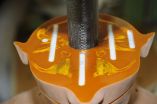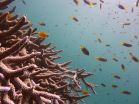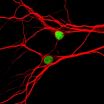Carrot or stick?
Game-theory can optimize collaboration
2014-12-03
(Press-News.org) This news release is available in German.
The new study establishes that the best combination for incentives and punishment that promotes cooperation are in the form of "First carrot, then stick". The mathematical proof shows how the combined sequential use of reward ("carrot") and punishment ("stick") promotes cooperation in collaborative endeavors, such as protecting social commons and maintaining mutual aid.
Rewards and punishments are the most tried and true approaches when trying to promote cooperation in collaborative endeavors. New research, in terms of evolutionary game theory, is examining a mixed policy of reward and punishment. In contrast, previous studies have only focused on either reward or punishment. As is well known, incentives can be costly and can be adjusted depending on a situation.
In this paper, Sasaki and his colleagues have taken a different approach and investigated what happens when maximizing evolutionary forces towards cooperation. Through game-theory analysis, the study finds that the best approach is to first reward minor cooperators, and then when a critical mass of cooperators is reached, completely switch to punishing free riders.
How is this applicable to contemporary issues? Take automobiles as an example where this hybrid approach can be implemented. Those who currently drive powerful gas-guzzling vehicles should switch to different engines and fuels that are more environmentally friendly. Sasaki and his colleagues mathematically show that a "first carrot, then stick" policy can drive cooperation toward a specific goal. "We have optimized the adaptive dynamics under a centralized incentive system. Therefore, fascinating future work would investigate how and when individuals voluntarily delegate the incentive control to a central authority", says Sasaki.
INFORMATION:
Publication in Journal of the Royal Society Interface:
Chen X, Sasaki T, Brännström Å, Dieckmann U. 2015: First carrot, then stick: how the adaptive hybridization of incentives promotes cooperation The Journal of the Royal Society Interface. December 2014.
http://dx.doi.org/10.1098/rsif.2014.0935 (as soon as online)
[Attachments] See images for this press release:

ELSE PRESS RELEASES FROM THIS DATE:
2014-12-03
Analysis of data from the MATROSHKA experiment, the first comprehensive measurements of long-term exposure of astronauts to cosmic radiation, has now been completed. This experiment, carried out on board and outside of the International Space Station, showed that the cosmos may be less hostile to space travellers than expected.
Among the many life-threatening hazards to the space traveller, cosmic radiation is a major one, considerably limiting the time astronauts may spend in space without incurring excessive risk to their health from too high a dose of this ionizing ...
2014-12-03
An Australian National University (ANU) mathematician has developed a new way to uncover simple patterns that might underlie apparently complex systems, such as clouds, cracks in materials or the movement of the stockmarket.
The method, named fractal Fourier analysis, is based on new branch of mathematics called fractal geometry.
The method could help scientists better understand the complicated signals that the body gives out, such as nerve impulses or brain waves.
"It opens up a whole new way of analysing signals," said Professor Michael Barnsley, who presented ...
2014-12-03
INDIANAPOLIS, December 2, 2014 -- Today, Eli Lilly and Company announced results from new analyses of two Phase 3 trials evaluating the relationship between cognitive and functional treatment effects in patients with mild Alzheimer's disease. Based on post-hoc analyses of the Phase 3 trials, the findings suggested that cognitive deficits were more apparent than functional deficits in mild Alzheimer's disease when measured with the Alzheimer's disease Assessment Scale-Cognitive (ADAS-Cog) and the Alzheimer's disease Cooperative Study-Activities of Daily Living (ADCS-ADL) ...
2014-12-03
Amsterdam, The Netherlands, December 2, 2014 - Detection, prevention, and preclinical treatment are three key areas that may make a difference in the battle to reduce the rapid rise of new Alzheimer's disease (AD) cases every year. These three topics are the focus of an important new supplement to the Journal of Alzheimer's Disease.
Organized by Guest Editor Jack de la Torre, MD, PhD, Professor of Neuropsychology at The University of Texas at Austin, the supplement is a novel guide to how Alzheimer dementia may be approached and managed right now, not years from now. ...
2014-12-03
Scientists have released details of a raft of new chemicals with potent anti-malarial properties which could open the way to new drugs to fight the disease.
A new paper in PNAS is the third published by the group at the Australian National University (ANU), which has collaborated with groups from around the globe to uncover potential ammunition in the fight against malaria.
Over 200 million people contract malaria each year, and the parasite that causes the disease has become resistant to most of the drugs currently available.
"The papers show the malaria parasite ...
2014-12-03
A glimmer of hope for corals as baby reef builders cope with acidifying oceans
While the threat of coral bleaching as a result of climate change poses a serious risk to the future of coral reefs worldwide, new research has found that some baby corals may be able to cope with the negative effects of ocean acidification.
Ocean acidification, which is a direct consequence of increased atmospheric carbon dioxide levels, is expected to have a deleterious effect on many marine species over the next century.
An international team examining the impact of ocean acidification ...
2014-12-03
Coral reefs provide a range of benefits, such as food, opportunities for income and education, but not everyone has the same access to them, according to a new study conducted by the ARC Centre of Excellence for Coral Reef Studies (Coral CoE) at James Cook University.
The researchers examined how people from 28 fishing communities in Madagascar, Kenya, Tanzania and Seychelles benefit from the marine environment.
For many years conservation in developing countries has been based on the assumption that improvements in ecosystem conditions, such as increasing coral reef ...
2014-12-03
December 3, 2014 -- Individuals conceived in the severe Dutch Famine, also called the Hunger Winter, may have adjusted to this horrendous period of World War II by making adaptations to how active their DNA is. Genes involved in growth and development were differentially regulated, according to researchers at the Leiden University Medical Center, Harvard University, and Columbia University's Mailman School of Public Health. Findings are published in the journal Nature Communications.
During the winter of 1944-1945 the Western part of The Netherlands was struck by a severe ...
2014-12-03
CHAPEL HILL, NC - UNC School of Medicine researchers have found for the first time a biochemical mechanism that could be a cause of "chemo brain" - the neurological side effects such as memory loss, confusion, difficulty thinking, and trouble concentrating that many cancer patients experience while on chemotherapy to treat tumors in other parts of the body.
The research, published in the Proceedings of the National Academy of Sciences, shows how the common chemotherapy drug topotecan can drastically suppress the expression of Topoisomerase-1, a gene that triggers the ...
2014-12-03
Coffee, apple juice, and vitamin C: things that people ingest every day are experimental material for chemist Eva-Maria Felix. The doctoral student in the research group of Professor Wolfgang Ensinger in the Department of Material Analysis is working on making nanotubes of gold. She precipitates the precious metal from an aqueous solution onto a pretreated film with many tiny channels. The metal on the walls of the channels adopts the shape of nanotubes; the film is then dissolved. The technique itself is not new, but Felix has modified it: "The chemicals that are usually ...
LAST 30 PRESS RELEASES:
[Press-News.org] Carrot or stick?
Game-theory can optimize collaboration






